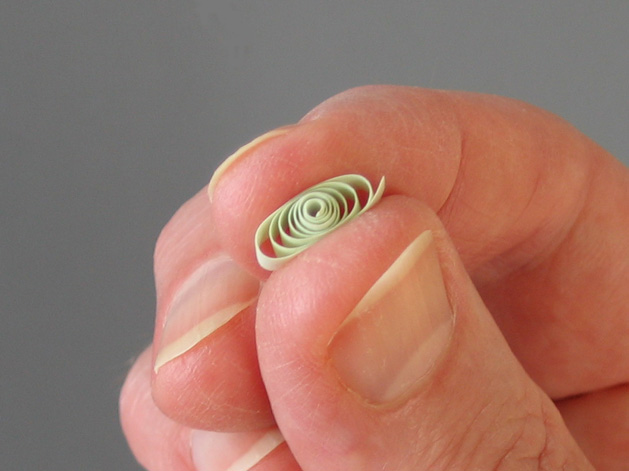


By Ann Martin
Even if you don’t consider yourself especially artistic, you can make this lovely handmade card! The cherry branch outline is drawn with a black felt-tip calligraphy marker. There’s honestly no right or wrong way…the wide, chiseled tip makes straight, bent, and intersecting lines look equally dramatic. Warm up your wrist by making practice lines on a sheet of scrap paper before moving on to your white cardstock.
The quilled leaves take a bit of practice too, but before long you’ll be rolling coils with the best of ’em. A bonus of this design is that the coils don’t have to match in size…in fact, a variety is best.
Materials
Cardstock, deep rose, spring green, white
Calligraphy marker, black, dual tip (Zig)
Punch, Five Flower Corner Punch (Punch Bunch)
Textured silver foil
Seed beads, pink pearl, mini
Quilling paper, spring green, 1/8” (you can substitute any lightweight paper and cut your own strips)
Quilling tool, needle tool, or slotted tool (a corsage pin or even a cocktail stick make fine substitutes)
Paper cutter
Adhesive foam dimensional dots
Double-sided tape
Glue, I like Elmer’s Clear Glue for quilling and Crafter’s Pick: The Ultimate does a great job of adhering foil and beads
Glass head pin or embossing tool
Round cocktail stick, use to apply glue to quilled coils and/or as substitute quilling tool
Plastic lid or acrylic sheet, use as glue palette
Ruler
Scissors
Tweezers
Damp cloth, to keep fingers glue-free
Directions
Step 1: Make card: Cut an 8 1/2” x 4 3/4” piece of deep rose cardstock. Score and fold card at midline of the 8 1/2” measurement to make a card that measures 4 1/4” x 4 3/4”.
Step 2: Cut a 4” x 3 1/2” rectangle of spring green cardstock. Adhere to card with double-sided tape.
Step 3: Cut a 3 3/4” x 3 1/4” rectangle of white cardstock. Sketch a cherry branch with the wide end of a dual-tip calligraphy marker. Apply adhesive foam dots on back at corners and between corners. Adhere to center of green rectangle.
Step 4a: Punch blossoms (about 14) from foil. I use foil that comes on yogurt containers because it’s strong and textured.
Step 4b: Give each blossom a cupped shape by placing it in the palm or on a fingertip and rubbing it in a circular motion with the ball of a glass head pin or embossing tool. Hold blossom with tweezers, touch to Crafter’s Pick glue, and place randomly on branch. Glue most blossoms singly, but pairs look nice too.
Step 5a: Make quilled leaves (about 14): Cut a variety of quilling strip lengths measuring 3, 4, 5, and 6 inches. (Strips can be cut in half lengthwise for an even more delicate look.) Dampen thumb and index finger, place end of strip over quilling needle and roll paper, creating a coil. Be sure to rotate the paper, not the tool.
Step 5b:
Allow coil to relax and slide it off tool.
Step6a:
Flatten coil between thumb and index finger.
Step 6b:
Pinch coil at each end, forming two points.
Step 7: Place a small amount of Elmer’s glue on palette and use cocktail stick to apply a tiny amount to strip end. Trim excess paper. Hold leaf with tweezers, dip underside in glue, and place directly on branch. Position some leaves singly, and others as pairs and triplets.
Step 8: Hold seed bead (about 12) with tweezers, touch to Crafter’s Pick glue, and apply to center of blossom. To vary the look, you might leave the beads off some of the blossoms.
About the Author:
Ann Martin of all things paper is a quilling enthusiast who loves introducing the craft to others. She teaches, designs projects for books and magazines, and is especially hooked on making paper filigree jewelry.
ADVERTISEMENT















